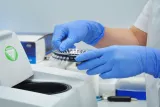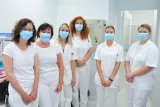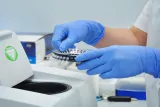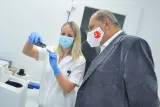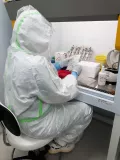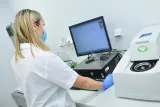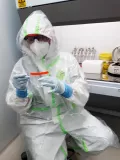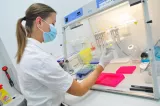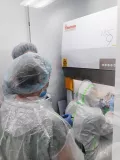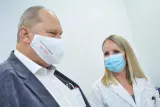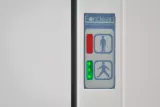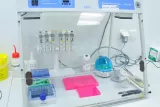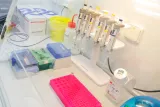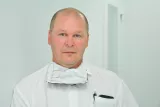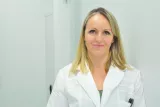Published: 20.04.2020
During the turbulent national and global developments concerning the spreading of the coronavirus, academics and students from the Faculty of Chemical Technology, University of Pardubice have decided to help with testing of samples of indicated patients for COVID-19. The testing procedure is coordinated by Prof. Roman Kanďár in cooperation with the Pardubice Hospital. In recent weeks, the whole procedure has been carefully planned and now the faculty can finally help the overloaded medical staff. Therefore we asked the main coordinator of the implementation team Prof. Mgr. Roman Kanďár, Ph.D., Head of Department of Biological and Biochemical Sciences, where the testing will be performed, and the guarantor of the Laboratories of Molecular Biology Mgr. Barbora Jankovičová, Ph.D., who will be the expert coordinator.
Where did the idea of helping with testing of biological samples come from?
Prof. KANĎÁR:
“The idea of this type of help came from the hospital management who asked the management of our faculty. The CEO of the Hospital of the Pardubice Region MUDr. Tomáš Gottvald, MHA asked our institution to help with testing of samples for SARS-CoV-2. Therefore I contacted Mgr. Barbora Jankovičová, Ph.D., who is the guarantor of the Molecular Biology Laboratories at our department. During the initial preparatory stages we checked our real possibilities from various perspectives (specialization of laboratories, equipment, analytical methodology, staff training) and started preparing for the analysis of samples.
Who is involved in the analysis of samples? Do you cooperate with other departments?
Mgr. JANKOVIČOVÁ:
“At the moment, our team at the department has three academics, two doctoral degree students and three laboratory staff. Naturally, we consult all procedures with professionals from other departments via regular videoconferencing.
Where does the testing of samples take place? Is the specialized laboratory equipped for this?
Prof. KANĎÁR:
“The testing of samples for the presence of SARS-CoV-2 will take place in a special laboratory with a higher biosafety level BSL-3, which can handle high-risk viruses and pathogens. These laboratories are adequately equipped with technical means to prevent infection from escaping freely into the environment by maintaining constant under pressure. The samples are inserted through a material sluice. The staff enter through a sluice room where they put on laboratory clothes and protective equipment provided by the hospital. After testing, the staff remove the clothes, take a shower, and put on their original clothes. All disposable protective equipment and biological materials are carefully decontaminated in an autoclave. Water from washbasins, sinks and showers goes to the decontamination station consisting of a collection reservoir and a decontamination tank. After the collection reservoir is full, water is pumped into the decontamination tank, into which a disinfection solution is added. Then a 24-hour decontamination process takes place and only after that the water flows to the neutralization station of FChT.”
How is the transport coordinated? And what is the transport procedure step by step?
Prof. KANĎÁR:
“Biological samples are transported in a triple safety packaging. The laboratory worker inserts the samples into the BSL-3 laboratory through a special material sluice. In the laboratory the samples are unpacked in a laminar flow-box.”
How many samples a day will you be able to test?
Mgr. JANKOVIČOVÁ:
“Unfortunately we are limited by the equipment. We don’t have large capacity automatic devices, for example RNA isolation will be performed manually, so roughly tens of samples, perhaps 50-100 per day, according to the demand and our possibilities. Although this amount may seem low, this type of assistance is desired in the current situation.
What is the testing method?
Mgr. JANKOVIČOVÁ:
“In the first step, the RNA nucleic acid of the virus will be isolated, then it will be reverse-transcribed to DNA, whose specific sections will be propagated and detected using a molecular biological method known as quantitative polymerase chain reaction (Real-time PCR).”
How long do you think you will be able to help the hospital?
Mgr. JANKOVIČOVÁ:
“Of course, we will try to perform the testing as long as possible. We believe that we are currently approaching the peak in the number of samples. It is estimated that in May or June the number of test samples could stabilize and start to decline slowly. We will see when and to what extent lectures in universities will resume. This will need to be effectively combined with the testing. Another factor that may affect the situation is of course the availability of diagnostic kits on the market.
If your help proves effective, will you consider sample analysis in the future?
Prof. KANĎÁR:
“Of course we are considering this type of assistance and we will surely support further testing. It is certainly a great experience for us, and we will surely use it in similar analyses in the future. Helping the hospital has opened an opportunity for expansion and modernization of the molecular biology laboratories at our department, which is good news for us. We believe that this activity is of great importance because it helps the hospital in early identification of patients and prevention of the spreading of the infection.
Prof. Mgr. Roman Kanďár, Ph.D. (*1968)
- Completed master’s degree Analysis of biological materials at the Faculty of Chemical Technology, University of Pardubice, doctoral degree programme Pathobiochemistry and xenobiochemistry at the Faculty of Pharmacy, Charles University in Hradec Králové, where he became Associate Professor in Biochemistry, later became Professor in “Analytical chemistry” at FChT, UPa
- Since 2019 has been Head of Department of Biological and Biochemical Sciences
- Specializes primarily in analysis of biological samples by separation techniques with a focus on metabolomics
- Has completed several scientific training courses at the University of Tübingen, Germany
- Supervises a number of theses on metabolomics and oxidative stress
Mgr. Barbora Jankovičová, Ph.D. (*1981)
- Studied master´s degree Analysis of biological materials at the Faculty of Chemical Technology, University of Pardubice, doctoral degree programme “Analytical chemistry” at FCHT, UPa
- From 2007 worked as a researcher at FChT, since January 2020 has been Assistant Professor
- Specializes primarily in molecular biology and proteomics with a focus on nucleic acids and proteins with clinical potential
- Has completed several foreign training courses (Institute Curie in Paris, Indiana University in Bloomington, KTH Royal Institute of Technology in Stockholm, Institute of Virology, Slovak Academy of Sciences, Bratislava)
- Was involved in several national and international projects (FP6 – NeuroTAS, FP7 – NaDiNe)
- Supervises a number of bachelor’s and master’s thesis on clinically relevant biomarkers with a focus on their identification, characterization, isolation, and detection
text: Mgr. Lucie Stříbrná, Ph.D.
Vice-Dean for Promotion and External Relations
photo: Milan Reinberk and Mgr. Jankovičová
